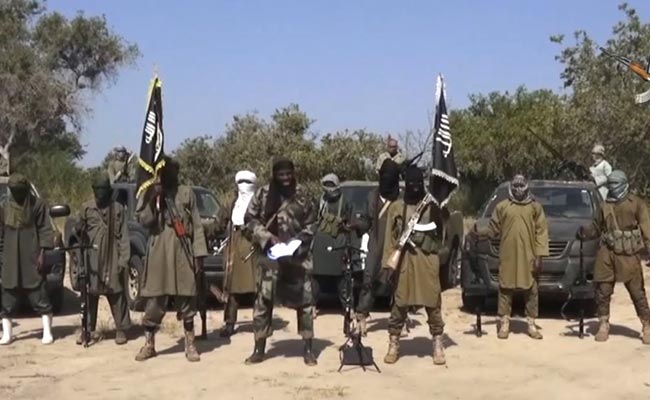
Though Chad has so far been spared from an attack by Boko Haram, the fact the Islamist militants are so close and so dangerous has been bad for business in this landlocked country.
Closed borders, security force patrols and the constant fear of violence spilling over its frontier have sent prices soaring and left business owners with one more worry.
“Prices for commodities have spiked,” Moussa Oumar, the owner of several auto parts stores in Chad’s capital city N’Djamena told AFP. “Customers complain, but I have no choice.”
The armed militants of Boko Haram operate in the extreme north of Cameroon which borders their Nigerian stronghold of Borno State – a mere 50 kilometres from N’Djamena.
“Boko Haram is just over there, on the other side,” taxi driver Dounama Boukar said pointing across the Chari River that delineates the border with Cameroon.
For now Chad has been spared a direct attack by Boko Haram, whose bloody five-year campaign to carve out a hardline Islamic state in northern Nigeria has left 10 000 people dead.
Yet the threat posed by the Islamists is ever present – with bloodshed continuing despite government claims the group had agreed to a ceasefire last month.
In an effort to protect its borders, Chad has outlawed all vessel traffic on the Chari, its tributary the Logone River as well as its section of Lake Chad.
River and shoreline patrols enforce the ban, leaving the waterways that were once thronged with commercial traffic nearly deserted. Not surprisingly, the drop in movement is bad for business.
“There are far fewer people,” Boukar, the taxi driver, said as he waited for clients in the baking sun at a border crossing from Chad to Cameroon.
Isolated from partners
Security forces are frequently in the area, checking vehicles for any contraband and weapons headed for Boko Haram fighters.
Many manufactured products like telecom equipment and auto parts come from neighbouring countries and Chad’s cattle exports to Nigeria form a crucial trade link.
Yet most of these products must make a dangerous journey through the Nigerian border town of Gambaru, which has been hit by numerous Boko Haram attacks. The disruption has hurt trade.
“The spare parts I sell, I order them from Nigeria,” auto parts store owner Oumar said. “Since the closure of the Cameroon-Nigeria border, my stores are no longer supplied.”
He continued: “Still, I have resupplied a bit through a friend who had some stock in Kousseri (Cameroon), but not at the same price. That’s why I have had to raise the price of spare parts.”
Boko Haram’s raids have also disrupted road traffic, including to the key central African port of Douala in Cameroon, disastrous for a landlocked country seeking to get its products to market.
The Islamists are “a destabilising element” for Chad because their attacks isolate the country from trading partners, a French military source in N’Djamena told AFP.
FRENCH VERSION
Bienque le Tchad a jusqu’à présent été épargnéd’une attaque par Boko Haram, le fait que lesmilitants islamistes sont si proche et sidangereux a été mauvais pour les affaires dansce pays sans littoral.
Frontières fermées, des patrouilles des forces desécurité et de la crainte constante de la violencedéborde de ses frontières ont envoyé la flambéedes prix et laissé des propriétaires d’entreprisesavec un souci en plus.
« Prix des matières premières ont dopé, »Moussa Oumar, le propriétaire de plusieurspièces de magasins dans la ville capitale du Tchad, que Ndjamena à l’AFP. « Clients se plaignent, mais je n’ai pas le choix. »
Les militants armés de Boko Haram opèrentdans l’extrême nord du Cameroun qui jouxteleur fief nigérian de l’état de Borno – un simple50 kilomètres de Ne Djaména.
Chauffeur de taxi « Boko Haram est juste là, surl’autre côté, » Dounama Boukar dit pointant à travers le fleuve Chari qui délimite la frontièreavec le Cameroun.
Pour l’instant le Tchad a été épargné uneattaque directe par Boko Haram, dont lacampagne sanglante cinq ans à se tailler un Étatislamique extrémiste dans le nord du Nigéria afait 10 000 morts.
Pourtant, la menace posée par les islamistes estomniprésente – avec effusion de sang continue,malgré les affirmations du gouvernement, legroupe avait accepté un cessez-le-feu le moisdernier.
Dans le but de protéger ses frontières, le Tchada proscrit tout trafic maritime sur le Chari, sonaffluent la rivière Logone ainsi que sa section dulac Tchad.
Rivière et rivage patrouilles appliquentl’interdiction, laissant les voies d’eau qui ont étéune fois remplis avec un trafic commercialpresque déserté. Il n’est pas surprenant, labaisse du mouvement est mauvaise pour lesaffaires.
« Il y a beaucoup moins de personnes, » Boukar,le chauffeur de taxi, a déclaré qu’il attendaitpour les clients sous le soleil de cuisson à unposte frontalier du Tchad, au Cameroun.
Isolés des partenaires
Les forces de sécurité sont fréquemment dans larégion, vérification des véhicules pour toutecontrebande et armes pour les combattants deBoko Haram.
Nombreux produits manufacturés commeéquipement de télécommunication et de piècesautomobiles viennent de pays voisins et debovins du Tchad exporte pour former du Nigeriaun lien commercial crucial.
Pourtant la plupart de ces produits doit faire unvoyage périlleux à travers la ville frontièrenigériane de Gambaru, qui a été frappé parnombreuses attaques de Boko Haram. Laperturbation a fait mal de commerce.
« Les pièces de rechange que je vends, je lescommander du Nigeria, » propriétaire demagasin de pièces auto Oumar dit. « Depuis lafermeture de la frontière Cameroun-Nigeria,mes magasins sont ne sont plus fournis. »
Il a poursuivi: “encore, j’ai momentanément unpeu grâce à un ami qui avait peu de bouillon àKousseri (Cameroun), mais pas au même prix.C’est pourquoi j’ai dû augmenter le prix despièces de rechange. »
Raids de Boko Haram ont également perturbé lacirculation routière, y compris à la clé centraleafricaine port de Douala au Cameroun,désastreux pour un pays enclavé qui cherchent àobtenir ses produits au marché.
Les islamistes sont « un élément déstabilisateur» pour le Tchad parce que leurs attaques isolerle pays de partenaires commerciaux, une sourcemilitaire Français à Ne Djamena à l’AFP.


